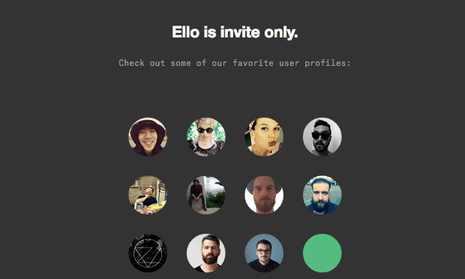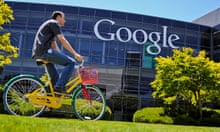Predicting the end of Facebook in 2014 feels reckless. Like slapping a date on the fall of the wall might have felt in the 1980s.
As of June this year, the social networking behemoth had 1.32bn active monthly users. According to the latest data from the Pew Research Centre, 71% of online adults use Facebook. Considering 73% use a social networking site, that’s pretty much: all of us.
The startup world is full of people pitching and failing the next big thing. Two days ago, though, something exciting happened. San Francisco began jumping out of Facebook’s ad-splattered soup and into the clean, empty social networking world of Ello.
Ello is crawling with bugs, isn’t out of beta testing, and it’s still taking off in starship headquarters. 31,000 new users were asking to be beta testers at this week’s peak. On Thursday, the Ello team had to shut down new invites to the site as they struggled to keep up.
The brain-child of Kidrobot designer Paul Budnitz , Ello is the “anti-facebook.” It’s been around a while, but the LGBTIQ community’s recent struggle with Facebook’s “real-name” policy has been instrumental in the shift to the site. Ello positions itself as a network with a manifesto and a social conscience. Its logo has a V for Vendetta-like menace to it: an eyeless black smiley with a spinning mouth that mocks the social gaze we are so used to feeding online.
Humans like us forget that change is the only constant. Facebook will not last forever. The only questions are why the move starts, when it does, and where the party is next.
This year marks a decade since Mark Zuckerberg and his motley crew of 20 year old programmers moved to Palo Alto, California, and defined a new phase in the internet’s infant history with their soothing blue sans-serif. Facebook has succeeded by providing us with a mirror during our early development. It’s inevitable demise will stem from a problem that only starts to hit you as you grow up: the complicated nature of time.
Facebook’s core identity management strategy is its photo albums. They’re the only part of ourselves that it lets us store, search and catalogue in any meaningful way. Narcissus-like, we can organise thousands upon thousands of images of our selves down through the years. There is no similar organizing function for the identities we create as we change: our thoughts, books, links, articles and music.
Considering that Facebook claims American users spend 40 minutes a day on the site – a whopping 243 hours a year – it’s no surprise that our past selves are starting to seem oppressive and unwieldy in their muumuus.
Facebook’s most important social function, the flipside to the photograph, used to be that it truly did give you a place to connect. A shared hive mind with people you would otherwise drift away from. Then Facebook began using a News Feed algorithms and default filters to choose whose posts you saw, they were trying to slow down the wall – and boost the likelihood you’d see Britney Spears’ updates over your friends. Its overall effect was infantalising. When Facebook acts like an overbearing parent, it’s only natural that the adults will want to move out.
The constant data-collection and streams of personalized advertising added injury to the insult of what was already feeling like a tight, airless social space. The internet can seem like so much light and pulses, but its effects are real. Visually and emotionally, the self you inhabit on Facebook is still a child.
Enter Ello.
A lot of the justified concerns surrounding the new networking site stems from how it will manage to protect user-data and stay advertising free.
Ello is absolutely defiant in its stance – you will not be commodified, you will not be managed – but as other beta-testers have shown, they did accept venture capital. $435,000 of it. And investors tend to want their money back, big and fast.
Ello says that it’s going to monetise by selling features. If that makes enough to keep their heads above water – and with its current growth rate, that’s an exciting “if” – let’s hope it can be sustainable. A networking site where you can pay to personalize, while still engaging some sort of coherent social space – not the screaming dark boom of the late days of MySpace – would have its appeal.
There are plenty of other features that would be useful tools as well. The ability to keep and share ideas, links and lists, and not lose things to the ever-hungry maw of the present would be a great boon.
Facebook already feels like a Tupperware party. That’s not always a bad thing. You want to turn up once in a while because it’s worth seeing people and eating cake with your Great Uncle Mark… even if there’s a risk you’ll walk away paying for the cake tin. 243 hours a year at the Tupperware party seems a lot, though.
We’re no longer internet infants. We can build pretty nice houses for ourselves if we aren’t busy looking in the mirror, mounted in a room where the walls are painted a gentle blue that we’re not allowed to touch.
Ello might not be “the one.” But it’s becoming clear that the teen years are upon us all, and we really want to move out.





